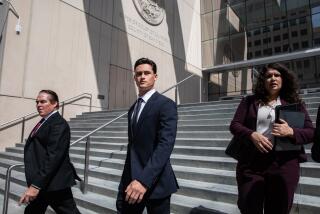‘Let’s Go Crazy’ suit: Woman whose kitchen video was yanked from YouTube wins court ruling
Reporting from SAN FRANCISCO — Stephanie Lenz was in her kitchen in rural Pennsylvania, filming her two young children having fun after dinner. As Prince’s song “Let’s Go Crazy” played, her toddler — clad in red pajamas — bounced up and down to the rhythm.
Lenz uploaded the video for friends and family to see on YouTube.
Eight years later, that 29-second snippet has had 1.3 million views and become the vehicle for a landmark ruling that could protect others who put their homemade videos on the Internet.
On Monday, the U.S. 9th Circuit Court of Appeals ruled that Lenz may hold Universal Music Corp. liable for ordering YouTube to take down the video if she can show the company failed to first consider whether the footage amounted to “fair use.” An exception in the copyright law, the fair-use principle allows people to use others’ creative works in criticism, teaching and other limited circumstances.
“If a copyright holder ignores or neglects our unequivocal holding that it must consider fair use before sending a take-down notification, it is liable for damages,” Judge Richard C. Tallman, a conservative appointed by former President Clinton, wrote for a three-judge panel.
The 9th Circuit said it was the first federal appeals court to rule on the issue.
Lenz sued Universal after the company included her kitchen footage, with Prince’s song playing in the background, in a list of more than 200 items it told YouTube were in violation of copyright law. YouTube yanked the video, but restored it six weeks later after Lenz fought back.
In refusing to dismiss Lenz’s suit, the 9th Circuit said the law clearly allows for fair use of copyrighted material, and people who issue take-down notices may be sued even if nobody lost any money as a result.
To avoid liability, Internet service providers typically take down videos immediately after being told the material infringed on a copyright — and before notifying the user who uploaded the material.
That person can send a “counter-notification” declaring the removal was unwarranted. The service provider then must notify the copyright holder and may restore the material if an infringement lawsuit is not filed within 14 business days.
“I am hopeful we will have fewer improper takedown orders,” said Corynne McSherry, a lawyer with the Electronic Frontier Foundation, which represented Lenz and advocates for Internet freedom. “Copyright holders now are on notice they have to be more careful.”
McSherry said the ruling would be important for the upcoming presidential primaries, which historically have led to a “rash of copyright takedown abuse” in which holders demand candidates remove protected material from their advertisements.
“We will all watch a lot of online video and analysis of presidential candidates in the months to come, and this ruling will help make sure that information remains uncensored,” McSherry said.
Michael Donaldson, a Beverly Hills entertainment lawyer who advises filmmakers on copyright law, said Monday’s ruling would not affect cases of clear-cut piracy. People who upload entire versions of creative material remain vulnerable, he said.
“It is very important that that be stopped, and this case has absolutely zero impact on that,” Donaldson said.
Instead, he expected the result would be fewer takedown notices of “mom-and-pop postings that happen to include a song in the background” and do not make money.
The 9th Circuit ruling cited a section of the 1998 federal Digital Millennium Copyright Act, which subjects copyright holders to liability for knowingly misrepresenting material as infringement. The court said holders have a “duty” to assess in good faith whether the material constitutes fair use.
In deciding whether the fair-use principle apples to a video, evaluators are supposed to consider whether it is commercial in nature, whether the copyrighted material dominated the video and how the video might affect the value of the copyrighted work. A typical example of fair use is a paragraph from a book cited by a reviewer to show the author’s style.
“We are mindful of the pressing crush of voluminous infringing content that copyright holders face in a digital age,” the 9th Circuit said. “But that does not excuse a failure to comply with the procedures” set down by the federal law.
A lawyer for Universal was unavailable for comment.
The company could ask a larger panel of the 9th Circuit to reconsider the case.
On Monday, Lenz, 43, said she was “happy to see some resolution, but I feel that we aren’t quite to the end of the road.”
Holden Lenz was 18 months old when he bounced up and down to “Let’s Go Crazy.” He is now 9. His mother said in an email that his favorite music is classical. Mozart, not Prince, tops his list.
Twitter: @mauradolan
ALSO
Emmy Award-winning sound editor from ‘X-Files’ killed in Moorpark crash
California fire updates: 1 dead as Valley fire burns 61,000 acres and counting
54 kayakers rescued in Northern California’s Tomales Bay during nighttime fish tour
More to Read
Sign up for Essential California
The most important California stories and recommendations in your inbox every morning.
You may occasionally receive promotional content from the Los Angeles Times.











